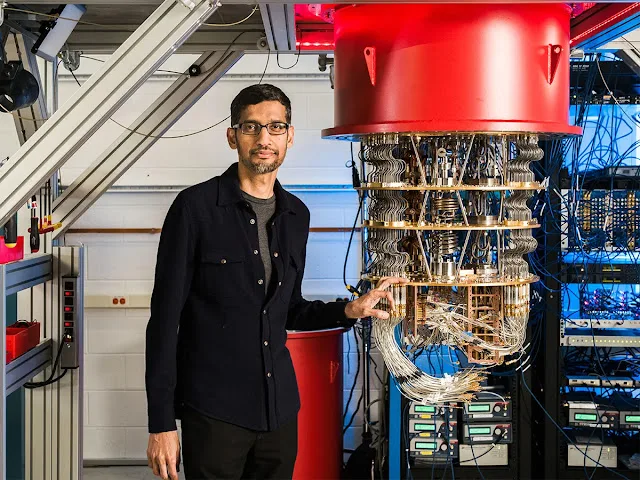Quick Overview (2-Minute Read):
- IBM leads with 1,121-qubit Condor processor
- D-Wave operates 5,000+ qubit quantum annealing system
- Google’s Quantum AI advances error correction capabilities
- Breakthrough improvements in quantum coherence and quantum volume
- Expanding real-world applications in finance, chemistry, and optimization
- Complete comparison of all 10 leading quantum systems
Comparison Table: Leading Quantum Computers
| Rank | Company | System Name | Qubits | Key Feature | Best For |
|---|---|---|---|---|---|
| 1 | IBM | Condor | 1,121 | Error Correction | General Purpose |
| 2 | D-Wave | Advantage | 5,000+ | Quantum Annealing | Optimization Problems |
| 3 | Quantum AI | 100+ | Quantum Supremacy | Research & Development | |
| 4 | Xanadu | X-Series | 216 | Photonic Qubits | Machine Learning |
| 5 | IonQ | Aria | 32 | High Fidelity | Precise Calculations |
| 6 | Intel | Tunnel Falls | 12 | Silicon Qubits | Scalable Computing |
| 7 | Rigetti | Aspen-M-3 | 80 | Hybrid Computing | Cloud Applications |
| 8 | Amazon | Braket | Various | Cloud Access | Enterprise Solutions |
| 9 | Microsoft | Azure Quantum | Various | Topological Research | Error Correction |
| 10 | Baidu | Quantum Leaf | 10 | Cloud Platform | Algorithm Testing |
Detailed Analysis of Each System
IBM Quantum System (Most Advanced Overall)
- Latest Achievement: 1,121-qubit Condor processor with advanced circuit capabilities
- Error Correction: Leading quantum error mitigation techniques
- Cloud Access: Comprehensive IBM Quantum Experience platform
- Real Applications: Drug discovery, materials science, financial modeling
- Cost: Enterprise subscriptions with academic access programs
D-Wave Advantage System (Largest Qubit Count)
- Technology: Quantum Annealing with 5,000+ qubits
- Specialization: Complex optimization problems
- Recent Breakthrough: Enhanced connectivity between qubits
- Access: Cloud-based through Leap platform
- Notable Users: Volkswagen, Lockheed Martin, pharmaceutical companies
Google Quantum AI (Best for Research)
- Architecture: Superconducting qubits
- Achievement: Quantum supremacy demonstration
- Error Rates: Significant improvements in error correction
- Focus: Research and algorithm development
- Current Development: Working toward error-corrected logical qubits
Xanadu Quantum Cloud (Most Innovative)
- Technology: Photonic quantum computing
- Advantage: Room temperature operation potential
- Applications: Machine learning, chemistry simulations
- Access: Cloud platform with Strawberry Fields API
- Cost-Effective: Pay-as-you-go model
IonQ Aria (Highest Fidelity)
- Technology: Trapped-ion qubits
- Quality: Highest algorithmic qubits (AQ)
- Recent Update: Enhanced quantum volume
- Access: Available through major cloud providers
- Perfect For: Precise scientific calculations
Additional Systems Analysis (Ranks 6-10)
Intel Tunnel Falls
- Architecture: Silicon-based quantum architecture
- Focus: Scalable manufacturing
- Integration: Compatible with semiconductor fabrication
- Development Tools: Horse Ridge control chip
- Target: Commercial applications
Rigetti Aspen-M-3
- Architecture: Multi-chip quantum processors
- Platform: QCS (Quantum Cloud Services)
- Technology: Advanced compiler technology
- Developer Support: Strong developer community
- Focus: Hybrid quantum-classical computing
Amazon Braket
- Offering: Multi-platform quantum access
- Support: Multiple quantum hardware providers
- Tools: Comprehensive development environment
- Pricing: Pay-as-you-go model
- Ideal For: Enterprise experimentation
Microsoft Azure Quantum
- Research: Topological qubit development
- Platform: Multi-vendor access
- Development: Q# programming language
- Algorithms: Quantum-inspired optimization
- Focus: Long-term scalable quantum computing
Baidu Quantum Leaf
- Platform: Cloud-based quantum computing
- Capabilities: Algorithm testing and simulation
- Focus: Quantum applications for AI
- Resources: Educational support
- Target: Quantum software development
Cost and Accessibility Comparison
- Enterprise Systems: $10M – $50M for dedicated hardware
- Cloud Access: Starting at $100/month for development access
- Research Partnerships: Custom pricing for academic institutions
- Development Tools: Many free and open-source options
- Training Resources: Growing educational ecosystem
Read more about quantum computer price
Real-World Applications and Impact
Financial Services
- Portfolio optimization with quantum algorithms
- Risk analysis for complex financial instruments
- Fraud detection pattern recognition
- Trading strategy optimization
Scientific Research
- Drug discovery and molecular simulation
- Material science for novel compounds
- Climate modeling with quantum advantage
- Fundamental physics research
Industry Solutions
- Supply chain optimization problems
- Energy grid balancing and efficiency
- Traffic flow optimization in urban planning
- Manufacturing process optimization
Future Developments (2024-2025)
- IBM’s roadmap toward more stable qubits
- Google’s continued work on error correction
- D-Wave’s next-generation annealing systems
- Quantum advantage demonstrations in specific domains
- Improvements in quantum programming languages
Comparison with Classical Computing
- Speed: Exponential advantage for specific problem types
- Energy: Currently higher consumption than classical systems
- Accuracy: Improving with error correction techniques
- Cost: Higher but gradually becoming more accessible
- Applications: Specialized problems vs. general-purpose computing
How to Choose the Right Quantum System
Consider Your Needs
- Problem type and complexity
- Required qubit count and quality
- Budget constraints
- Access requirements (cloud vs. dedicated)
- In-house technical expertise
Evaluate Options
- Cloud-based vs. dedicated hardware
- Support and documentation quality
- Development tools compatibility
- Integration with existing infrastructure
- Future roadmap alignment
Questions People Ask About Quantum Computers
Q: What makes a quantum computer powerful?
A: It’s mostly about quality, not just quantity. Sure, having lots of qubits helps, but what really matters is how well they work together. Think of it like a sports team – you need players who can stay in the game (coherence time), make fewer mistakes (low error rates), and work well as a unit (quantum volume). A small, well-coordinated team often beats a larger, disorganized one.
Q: Which quantum computer has the most qubits?
A: Right now, D-Wave has the most with their 5,000+ qubit machine. But here’s the thing – these qubits are designed for solving very specific problems, not general computing. It’s kind of like having a super-powerful calculator instead of a full computer.
Q: What’s the best all-around quantum computer?
A: IBM’s Condor with 1,121 qubits is probably your best bet for general-purpose work. It’s not the biggest, but it’s built to handle lots of different tasks pretty well.
Q: How much does using a quantum computer cost?
A: It ranges from pretty affordable to crazy expensive. You can get started on cloud services for about $100 a month – not much more than a cell phone plan. But if your company wants its own system? That’ll be up to $50 million. Most folks start with cloud access to test things out.
Q: Which one should beginners try first?
A: Start with IBM Quantum Experience or Amazon Braket. They’re like the “beginner slopes” of quantum computing. They have good tutorials, lots of help documents, and won’t break the bank while you’re learning.
Q: Will these replace our regular computers?
A: Nope, not a chance. Your laptop is safe! Quantum computers are like specialized tools for specific jobs. They’re amazing at solving certain complex problems but terrible at everyday stuff like web browsing or word processing. They’ll work alongside regular computers, not replace them.
Wrapping Up: What’s Next for Quantum Computers
The quantum world is moving super fast these days. The big players like IBM, D-Wave, and Google are pushing ahead, but smaller companies are coming up with clever ideas too.
I’ve been watching this field for years, and I’m excited about what’s coming in 2024 and 2025. The biggest improvements will probably be in error correction (basically making these machines more reliable) and finding real problems where quantum computers actually work better than regular ones.
Most companies are still figuring out exactly how to use these machines in practical ways. It’s like the early days of regular computers – lots of potential but we’re still working out the kinks.
Just remember: Don’t get hung up on how many qubits a machine has. That’s like buying a car based only on horsepower. I’ve seen this mistake too many times – companies go after the biggest machine when what they really need is one that’s right for their specific problems. My neighbor bought a fancy sports car but can’t fit his work equipment in it – don’t be that guy with quantum computers!
How to Keep Up
- Follow tech news sites that cover quantum stuff
- Jump into online forums where developers hang out
- Try the free access options on quantum cloud platforms
- Look into some basic training courses
- Start with quantum-inspired methods on your current computers


.png)

